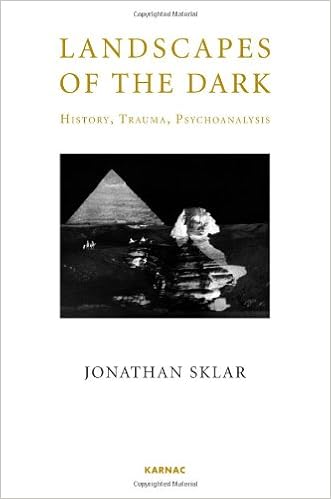
By Jonathan Sklar
During this vital new choice of essays, Jonathan Sklar argues that the founding rigidity among Freud's dedication to interpretation and Ferenczi's additional parameter of 'being within the adventure' has a valuable place/key position to play in modern psychoanalytic debate, and that this rigidity can top be understood by means of returning to where of trauma in psychoanalysis. Taking this debate into the guts of the Read more...
Read Online or Download Landscapes of the Dark : History, Trauma, Psychoanalysis. PDF
Best psychoanalysis books
Hatred and Forgiveness (European Perspectives: A Series in by Julia Kristeva PDF
Jeanine Herman (tr. )
Julia Kristeva refracts the impulse to hate (and our makes an attempt to subvert, sublimate, and in a different way strategy it) via psychoanalysis and textual content, exploring worlds, ladies, faith, graphics, and the act of writing. Her inquiry spans topics, subject matters, and figures vital to her writing, and her paths of discovery strengthen the theoretical thoughts which are so attribute of her thought.
Kristeva rearticulates and extends her research of language, abjection, idealization, woman sexuality, love, and forgiveness. She examines the "maladies of the soul," using examples from her perform and the illnesses of her sufferers, reminiscent of fatigue, irritability, and common malaise. She resources the Bible and texts by means of Marguerite Duras, St. Teresa of Avila, Roland Barthes, Simone de Beauvoir, and Georgia O'Keefe. Balancing political calamity and person pathology, she addresses inner and exterior catastrophes and international and private accidents, confronting the character of melancholy, obliviousness, worry, and the suffering of being and nothingness.
Throughout Kristeva develops the idea that psychoanalysis is the major to serenity, with its procedures of turning again, on reflection, investigating the self, and refashioning psychical harm into anything beneficial and gorgeous. consistent wondering, Kristeva contends, is key to attaining the arriving to phrases all of us search on the center of forgiveness.
Read e-book online Le moi et le ça (inédit) PDF
Le Moi et le Ca, paru en 1923, est los angeles clé de voûte de ce qu'on appelle los angeles "seconde topique" chez Freud. A l'empilement pyramidal de l'inconscient, du pré-conscient et du conscient (première "topique" de los angeles psychanalyse) succède une notion du système psychique plus fluide, interactive et dialectique, dans laquelle le Moi s'avère très lié à l'inconscient, lequel ne coïncide plus avec le refoulé.
Read e-book online Lacan: The Unconscious Reinvented PDF
Has Jacques Lacan's impression on psychoanalysis relatively been assessed? His formula that the Freudian subconscious is "structured like a language" is recognized, yet this used to be basically the start. there has been then the appreciably new thesis of the "real unconscious". Why this step? looking for the Ariadne's thread that runs all through Lacan's ever-evolving educating, this ebook illuminates the questions implicit in every one step, and sheds new gentle on his revisions and renewals of psychoanalytic suggestions.
Get Toward a Psychology of Uncertainty: Trauma-Centered PDF
In view that trauma is a completely relational phenomenon, it really is hugely unpredictable, and can't be made to slot in the clinical framework Freud so well known. In towards a Psychology of Uncertainty: Trauma-Centered Psychoanalysis, Doris Brothers urges a go back to a trauma-centered psychoanalysis. utilising relational platforms thought, she exhibits that reports of uncertainty are consistently reworked by way of the regulatory techniques of lifestyle comparable to feeling, understanding, forming different types, making judgements, utilizing language, growing narratives, sensing time, remembering, forgetting, and fantasizing.
- The Early Years of Life: Psychoanalytical Development Theory According to Freud, Klein, and Bion
- The Psychoanalytic Model of the Mind
- Supervision in Psychoanalysis: The São Paulo Seminars
- Political Freud : a history
Additional resources for Landscapes of the Dark : History, Trauma, Psychoanalysis.
Example text
That in itself is a great deal and can be a form of silent participation by just being there. This can be a most unusual experience for the very ill patient, who has been filled with an earlier knowledge of what the other wants for himself. Michael Balint described an “Area of Basic Fault” where the patient is silent, lifeless, and hopeless. Such a phase, Enid Balint later elaborated, is only overcome when this phase is worked through, that is, when the patient is no longer regressed to a stage where he has no mutual experience with his analyst but becomes silently hostile, disillusioned and desperate and eventually appears to give up hope.
Regression, the psyche-soma, and various ways of understanding the complexities of trauma are the central concerns of this book. All of these concepts offer new opportunities 8 L A N D S CA P E S O F T H E DA R K to articulate the relationship between history and the unconscious. The clinical focus is slanted towards the analysis of some severely ill people who have unconsciously had to develop psychotic, addictive, or psychosomatic strategies in order to survive. These strategies have the profoundest implications for the question of analytic technique.
It is not uncommon that various pieces of unwanted transferences from the analyst’s own analysis creep in to his practice. For instance, the way the analyst organizes his practice is often highly modelled on his perception of the way his own analyst did things. Already one may be unconsciously providing for the perceptive enough patient, a dual model of oneself as analyst but also one’s own analyst inside oneself. Such things are not necessarily adverse unless of course they exist in an unknown state to the analyst and as such can provide unthoughtful enactments that can become an impingement on the patient.



